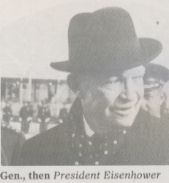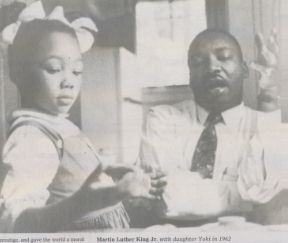 For lovers of history, this is the last president's column of the millennium.
Lovers of math will have to wait a year, and then party not "like it's 1999." At
this momentous millennial moment, many are pausing to consider who are the greatest people
of the century and millennium, and what are the measures of greatness and leadership.
Turning briefly from the trials and tribulations of the legal profession, this last column
provides a list of great people. For lovers of history, this is the last president's column of the millennium.
Lovers of math will have to wait a year, and then party not "like it's 1999." At
this momentous millennial moment, many are pausing to consider who are the greatest people
of the century and millennium, and what are the measures of greatness and leadership.
Turning briefly from the trials and tribulations of the legal profession, this last column
provides a list of great people. At the 1991 State Bar Annual Meeting in Anaheim, I was
shocked by a Disneyland poll which put Mark Spitz in the running for Person of the
Century. Since then, I have been campaigning to get some perspective beyond Spitz as an
icon of greatness, and most would agree that State Bar presidents need all available
lessons in leadership.
I believe greatness in leadership comes from courage, selflessness and foresight.
Courage is having principals and sticking with them. Selflessness is serving others
without expectation of personal gain. Foresight is recognizing where we can and should be
in the future, and then working in the present to obtain the ideal.
Focusing briefly on the millennium provides names such as Washington, Jefferson,
Churchill, Luther, Shakespeare, Elizabeth I, Lincoln, Beethoven, Calvin, Aquinas, Francis
of Assisi, da Vinci, Joan of Arc, Michelangelo, Einstein, Darwin, Galileo, Newton, Smith
and Victoria.
Focusing on the great people of the 20th century reveals that war remains too
important, women and minorities have been denied opportunity and Western civilization
still dominates. The list includes too many war leaders, too few women and minorities, and
many inspiring products of our culture. Honorable mention goes to Gorbachev, Thatcher,
Gandhi, Picasso, Freud, the Roosevelts (Franklin, Teddy and Eleanor), Ford, Edison,
Turing, Salk, Shaw, Adenauer, Pope John XXIII, C.S. Lewis, Graham, Eliot, Joyce, Robinson,
Armstrong (Louis, not Neil), Friedman, Jagger/Richards, and Mrs. Everest and my parents.
Surpassing this inspiring list are the following five greatest people of the 20th century:
NUMBER 5 - MOTHER TERESA
If humans have souls, those who touch our souls impact an infinity of time, rather than
simply a lifetime of 70 years or even a millennium. Mother Teresa has touched our souls,
and reminds us that most all trappings of greatness are material and therefore only
finite. Winner of the 1979 Nobel Peace Prize, she served selflessly without expectation of
power or prestige, and gave the world a moral example that bridged divides of culture,
class, and religion.
NUMBER 4 - DWIGHT DAVID EISENHOWER
 This
simple, gentle general is not likely to rank high on many lists. But just as Washington,
the military general, outshines Jefferson, the elegant thinker, so General Eisen-hower
outranks FDR. This partly reflects the sad facts that wars can change history faster than
ideas. Eisenhower led the greatest army in history, succeeding in Africa, Italy, France,
and Germany. Without his leadership on June 5 and 6, 1944, the Normandy invasion might
have failed and World War II might have ended differently than with American and British
troops meeting Soviet troops in Germany. He was the glue holding together the powerful
personalities in Allied leadership. As president during the quiet '50s, Eisenhower helped
build the interstate highway system, sent troops to Little Rock to fight the racial war,
and sent John Foster Dulles to fight the cold war which now has been won. This
simple, gentle general is not likely to rank high on many lists. But just as Washington,
the military general, outshines Jefferson, the elegant thinker, so General Eisen-hower
outranks FDR. This partly reflects the sad facts that wars can change history faster than
ideas. Eisenhower led the greatest army in history, succeeding in Africa, Italy, France,
and Germany. Without his leadership on June 5 and 6, 1944, the Normandy invasion might
have failed and World War II might have ended differently than with American and British
troops meeting Soviet troops in Germany. He was the glue holding together the powerful
personalities in Allied leadership. As president during the quiet '50s, Eisenhower helped
build the interstate highway system, sent troops to Little Rock to fight the racial war,
and sent John Foster Dulles to fight the cold war which now has been won.
NUMBER 3 - ALBERT EINSTEIN
Brilliant scientific thinkers such as Galileo and Hawking often speed up history, but
rarely change it. If Galileo had never lived, another scientist would have discovered the
same reality. Scientists build on the work of their predecessors in a march toward a
fuller understanding of objective reality. Brilliant scientists get the march moving a
little faster, but the destination remains the same. The unsurpassed brilliance of
Einstein, however, turned the march into a race which helped win World War II. Moreover,
the race placed power in the hands of a benevolent America rather than elsewhere in the
period immediately after the war. The world would be different without Einstein's August
1939 letter to FDR about the possibility of an atomic bomb. A 1921 Nobel Prize winner in
physics, Einstein was accomplished beyond the world of science and was offered the
presidency of Israel. Rejecting this trapping of power, Einstein relied on his brilliance
alone to alter our perceptions of the basic concepts of existence: time, space, matter and
energy.
NUMBER 2 - DR. MARTIN LUTHER KING JR.
 The courage, charisma and eloquence of Dr. King may have
prevented a racial war that would have left history's greatest country divided and
weakened. If wars can change history, so can those preventing wars. Dr. King was a
peacemaker appropriately awarded the 1964 Nobel Peace Prize, and uniquely honored with an
American national holiday. Following in the footsteps of Gandhi, King demonstrated the
courage it takes to be a peacemaker. He kept his eye on the prize despite being stabbed in
New York, stoned in Chicago and bombed in Montgomery. His tragic Memphis martyrdom
underscored the threat of racism and the depth of Dr. King's courage to give his last full
measure of devotion. The courage, charisma and eloquence of Dr. King may have
prevented a racial war that would have left history's greatest country divided and
weakened. If wars can change history, so can those preventing wars. Dr. King was a
peacemaker appropriately awarded the 1964 Nobel Peace Prize, and uniquely honored with an
American national holiday. Following in the footsteps of Gandhi, King demonstrated the
courage it takes to be a peacemaker. He kept his eye on the prize despite being stabbed in
New York, stoned in Chicago and bombed in Montgomery. His tragic Memphis martyrdom
underscored the threat of racism and the depth of Dr. King's courage to give his last full
measure of devotion.
NUMBER 1 - SIR WINSTON S. CHURCHILL
 His extraordinary impact upon history, combined with his many accomplishments,
make Winston Churchill the clear choice as Person of the Century. Long ago he was properly
named Time's Man of the Half Century, and he remains unsurpassed. His courage, charisma,
eloquence and character saved England from Germany, and may have saved democracy from
totalitarianism. The RAF flew into the Battle of Britain on Churchill's pleadings. Beyond
Churchill's finest hour in World War II, there was a lifetime of remarkable achievement
and adventure. The man who first described the Iron Curtain in 1946 also participated in
history's last great cavalry charge. The man who led the free world in World War II also
fought in the World War I trenches and was a hero in the Boer War. The man who won the
1953 Nobel Prize for Literature also created paintings heralded by connoisseurs. The man
responsible for the development of the tank also mobilized the English language and sent
it into battle with power unmatched by any English orator this century except Martin
Luther King Jr. The man is Winston Churchill. Person of the Century. His extraordinary impact upon history, combined with his many accomplishments,
make Winston Churchill the clear choice as Person of the Century. Long ago he was properly
named Time's Man of the Half Century, and he remains unsurpassed. His courage, charisma,
eloquence and character saved England from Germany, and may have saved democracy from
totalitarianism. The RAF flew into the Battle of Britain on Churchill's pleadings. Beyond
Churchill's finest hour in World War II, there was a lifetime of remarkable achievement
and adventure. The man who first described the Iron Curtain in 1946 also participated in
history's last great cavalry charge. The man who led the free world in World War II also
fought in the World War I trenches and was a hero in the Boer War. The man who won the
1953 Nobel Prize for Literature also created paintings heralded by connoisseurs. The man
responsible for the development of the tank also mobilized the English language and sent
it into battle with power unmatched by any English orator this century except Martin
Luther King Jr. The man is Winston Churchill. Person of the Century.
If you want to change this list (as I often do), become mathematically correct and
let's chat this time next year as we begin the real new millennium. |

